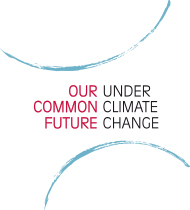�
Our Common Future Under Climate Change
International Scientific Conference 7-10 JULY 2015 Paris, France
Fotos GovBA
Climate change impacts on health may be catastrophic, but there�s hope
201507-10
By Dr Mark Ziembicki, James Cook University
Health has largely been neglected as a climate change issue, yet climate change impacts on health may be potentially catastrophic. The recently released Lancet Commission on Health and Climate Change goes as far as referring to the potential health impacts of climate change as a medical emergency, the effects of which could undermine the last half century�s gains in development.�
Climate change affects social and environmental determinants of health, including clean air, food and water availability and shelter security. A warmer climate is expected to both increase the risk of heat-related illnesses and death, and decrease air quality.�
Climate change will also likely increase the frequency and strength of extreme events (such as floods, droughts, and storms) that threaten human safety and health, and may allow some diseases to spread more easily. It could also lead to food insecurity and under�nutrition, displacement, and mental ill health.
According to lead author Nick Watts� summary of the Lancet Commission�s report impacts may be particularly acute due to multiple interacting effects. Whats more is that they are already occuring. And he cites some frightening statistics such as an additional 3 billion people exposed to heatwaves, 1.4 billion more person drought events and significantly increased exposure to vector borne diseases.
Given these dire predictions why then has the issue of health and climate change received so little attention until recently?�
One reason may be that health impacts will be most acute for developing countries and socially disadvantaged people � those people that have the least influence on research directions and public health and climate change policies.
�
Accounting for worst case scenarios
Another reason may be the underestimation of the risk that climate change poses to public health. As David King, former Chief Science Advisor to two British Prime Ministers argued during a session at the Our Common Future Under Climate Change conference, many UK government policies developed to consider national security and public interest issues are based on understanding levels of risk and planning for worst case scenarios. Having a clear picture of risk, and avoiding outcomes that may be potentially catastrophic even if they are unlikely, helps governments decide what to do.�
When it comes to climate change, however, worst case scenarios haven�t featured in government planning. According to King this is, in part, because scientists largely consider best case scenarios and tend to show the most likely impact. Another reason may be that the worst impacts are predicted to occur in the longer term � a timescale of policy planning that politicians are notoriously bad at.
As Watts says, �Achieving a low carbon global economy and securing public health benefits is no longer a technical or economic issue, but a political one�. King suggests that we in the scientific community need to think carefully what our research priorities should be and present our findings in terms that are easily understood by government leaders if we are to avoid the worse of outcomes due to a 4�C+ temperature rise.
There is hope
But it is not all doom and gloom on the health front according to the Lancet Commission and Maria Neira, Director of Public Health at the World Health Organisation. Indeed, according to the commission, responding to climate change could be the greatest health opportunity of this century.
The most effective way to address the issue is through provision of effective public health services, particularly for those people that are likely to be most seriously affected and have least access to services.
Although Alastair Woodward in his introduction to the conference session signalled a note of caution in being too influenced by how far co-benefits can go in improving health outcomes through tackling climate change, Neira points out the value of such co-benefits to public health.�
For example, the lack of access to clean energy in the poorest homes causes 4.3 million deaths/year and contributes to Short-Lived Climate Pollutants (SLCPs). Implementing measures to address SLCPs is expected to not only save 2.5 million lives per year but to �avoid 0.5�C of warming by 2050.
Neira suggests that the Paris climate agreement is the most important public health agreement of the century, and continues with suggestions for tackling climate change for public health outcomes including:
1.�Quantifying mitigation as a public health opportunity
2.�Supporting local governance for health, climate change & sustainable development
3.�Having the health sector lead by example through scaling up energy access while becoming greener itself. The healthcare industry in the US, for example, is responsible for 5-8% of GHG emissions.
4.�Monitoring progress on health and climate change, and
5.�Mobilising health to advocate for an effective climate change agreement
�If governments don�t want to do it for the climate then they should do it for human health�. �Neria says.�
Recognising the risks of not acting and the need to effectively communicate these risks along with the benefits of tackling climate change to politicians is critical. Our fate is in their hands, but ultimately they�re here to represent us, so it�s up to us as scientists and the general public to make these risks and benefits understood and policies implemented.�
Mark Ziembicki is Senior Research Fellow at James Cook University in Australia and senior researcher on the State of the Tropics Project. His research focuses on ecosystems and societies of the tropics. He is also a co-director of Cinematic Science - a production company specialising in creating inspiring science based media content.







